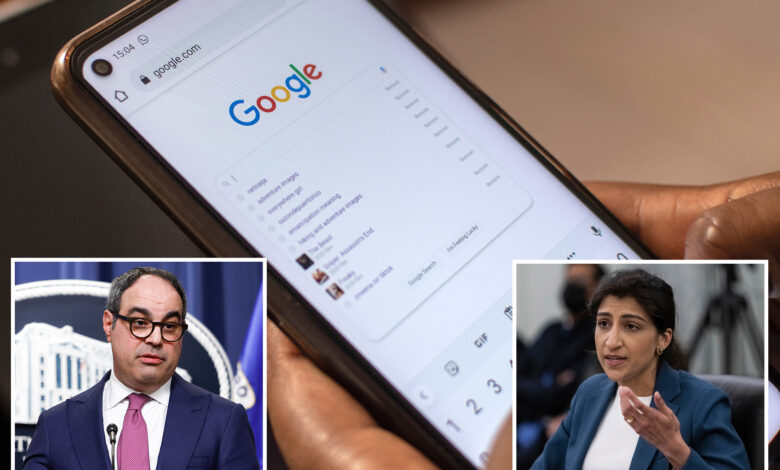Google pushed to cement search monopoly even after DOJ trial began: letter

Google has lately taken “several brazen high-profile actions” to expand the monopoly of its search engine – thumbing its nose at regulators even after its landmark antitrust trial with the Justice Department began last fall, watchdog groups warned in a Tuesday letter to the feds.
The letter, which was sent to FTC chief Lina Khan and the DOJ’s top antitrust lawyer Jonathan Kanter and obtained exclusively by The Post, asserted that Google is still moving “full steam ahead” with anticompetitive practices despite the regulatory crackdown to date and the DOJ’s effort to expose its shady tactics during the “historic” search trial.
Several prominent anti-monopoly organizations – including Demand Progress, the Revolving Door Project, Fight for the Future and the Tech Oversight Project — were among the 15 groups that urged a coordinated crackdown on the corporate giant.
“Google’s ongoing efforts to entrench its monopoly position in search — and exclude or buy off potential rivals — demonstrate that even the DOJ’s lawsuit and heightened regulatory scrutiny abroad have not deterred the company,” the letter said.
The letter points to three separate recent developments, including a reported partnership to embed Google search results within TikTok.
The tie-up surfaced last September in the midst of the DOJ’s antitrust trial, where lawyers were laying out their argument that Google has relied on such deals to stifle potential competition.
“This extraordinary maneuver betrays Google’s sense of its own impunity, even as the company is being scrutinized for exclusionary deals to make it the default search engine on a variety of devices and in a variety of browsers,” the letter said.
The letter also noted recent reports that Google has begun testing an artificial intelligence tool called “Search Generative Experience” and discussed integrating advanced AI tools into its search engine.
An AI-integrated Google search would “allow Google to use AI to scrape information from across the internet and present comprehensive results to users…while systematically diverting traffic (and the economic benefit derived from traffic) away from the source websites that Google has scraped,” the letter said.
The warning echoed complaints by news outlets who have slammed Google and Microsoft-backed OpenAI from using copyrighted material to train the “large language models” that power their AI chatbots without proper credit or compensation.
Lastly, the antitrust groups reference an open letter last November to the European Commission from 30 companies which allege that Google has engaged in anti-competitive self-preferencing by boosting its own “comparison shopping service” over rivals in search results.
The companies warned they “will be wiped out” unless European regulators take action.
“Amid historic and deeply credible monopoly cases against Google, one could be forgiven for thinking that it might cause Sundar Pichai and Google leadership to rethink its likely illegal business practices,” Sacha Haworth, executive director of the Tech Oversight Project, said in a statement. “That simply hasn’t been the case.”
“From buying up new search markets to building moats around its AI products, Google is continuing to exclude competitors, limit choice for consumers, and manipulate our entire economy,” Haworth added. “Google needs to be held accountable so that they play by the same rules as everyone else.”
Andrea Beaty, research director at the Revolving Door Project, said Google has been “tirelessly seeking to entrench any anti-competitive advantage that slips under the radar of regulators.”
“The DOJ and FTC must pursue constant, robust, and comprehensive enforcement in order to rein in the Big Tech monopolies, as their entrenched power cannot be reversed with stand-alone enforcement actions,” Beaty added.
Top Congressional leaders from both parties are also copied on the letter, including Senate Majority Leader Chuck Schumer (D-NY), Senate Minority Leader Mitch McConnell (R-Ky.), House Speaker Mike Johnson (R-La.) and House Democratic Leader Hakeem Jeffries (D-NY).
The groups called on Congress to “strengthen existing laws to protect consumers, businesses, and marginalized communities from Google’s abuses.”
“We urge you to continue to use the full power of your offices to bring Google into compliance with the law, including through forward-looking remedies that address the company’s scale, the cumulative effects of its harm, and the need for new technological disruptions to emerge,” the groups said.
The DOJ and FTC declined to comment.
A Google spokesperson pushed back on the letter’s assertions.
“As we’ve said all along, people have more ways than ever to access information, and they choose to use Google because it’s helpful,” a spokesperson said in a statement.
Google pointed out that the company has been testing AI features in search for years. The company asserted that a recent boom in AI technologies shows it faces intense competition in the sector.
The company also noted it is currently appealing a $2.6 billion fine imposed by European regulators over its shopping business. Google has denied wrongdoing in that case.
Google is currently awaiting US District Judge Amit Mehta’s decision on whether it maintains an illegal monopoly over online search, which is expected in May.
Mehta – who has faced sharp criticism for allowing the high-profile trial to play out with unprecedented secrecy – said in November that he had “no idea” how he would rule.
DOJ lawyers argued Google uses huge payments to partners like Apple and AT&T — including $26.3 billion in 2021 alone – to ensure its search engine is enabled by default on most products and maintain a 90% market share.
The search giant is facing a wave of other lawsuits targeting aspects of its sprawling business empire, including a highly anticipated US antitrust trial over its digital advertising business slated to begin in September.
In December, Google was handed a stunning defeat after a jury found its “Play” store for Android apps was a monopoly.
A federal judge will determine what business practices Google must change as a result of the verdict.




